|
|
|
Sort Order |
|
|
|
Items / Page
|
|
|
|
|
|
|
| Srl | Item |
| 1 |
ID:
106368


|
|
|
|
|
| Publication |
2011.
|
| Summary/Abstract |
The article by Jacob Mundy in this issue of Security Dialogue draws attention to the ongoing debate between deconstructivists and quantitative researchers. The article criticizes the current state of the 'new literature on civil wars' and offers some recommendations as to how this literature might be improved. Yet, as a scholar on the receiving end of it, I am unable to make use of Mundy's critique. I do not understand the premises for his article; I am not convinced by the case of Algeria; and I am unable to understand the recommendations made at the end of the piece. In other words, the dialogue here is not working. In large parts, this failure in communication is due to the fact that the relevant literatures very rarely connect with each other. The use of concepts in Mundy's article might represent one of the few occasions on which they do. I propose a set of recommendations that I hope might assist in rendering the dialogue between these currently estranged literatures less futile.
|
|
|
|
|
|
|
|
|
|
|
|
|
|
|
|
| 2 |
ID:
106367
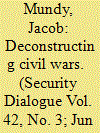

|
|
|
|
|
| Publication |
2011.
|
| Summary/Abstract |
The identification of intra-national armed conflict as a leading problem for the international community in the 1990s produced a wave of novel research into civil wars. Though these new civil war studies soon began to claim a degree of consensus on several key questions, the very concept and ontology of civil war has been implicitly and explicitly contested. An examination of the politics of naming civil wars likewise reveals the extent to which varying and sometimes conflicting definitions of civil war are still in circulation among various observer types. Instead of adjudicating these disputed definitions of civil war, this article details the way in which particular conceptions of civil war produce their object of analysis. The recent Algerian conflict stands as an excellent case study in the politics of naming civil wars and the ways in which the conceptual frameworks of the new civil war studies make Algeria into a civil war. To go beyond the contested definition of civil war, the new civil war studies should not judge the viability of concepts of mass armed violence - whether civil war or so-called new wars - on their alleged coherence with particular representations of history. Concepts of mass violence should instead be judged in relation to the political goals from which they obtain their warrant in the first place.
|
|
|
|
|
|
|
|
|
|
|
|
|
|
|
|
| 3 |
ID:
106364
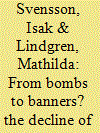

|
|
|
|
|
| Publication |
2011.
|
| Summary/Abstract |
One of the most important debates in the field of peace and conflict research concerns whether wars and armed conflicts are declining over time. The region where this plays out most markedly is East Asia: having suffered some of the world's most brutal wars in the period prior to 1979, the region has since witnessed an era of relative peacefulness. This article asks whether the decline in the level of war in the region reflects a change in the means used to pursue conflicts: are conflicts that previously were fought with arms increasingly manifested through unarmed uprisings based on strategic nonviolent actions? Examining the empirical patterns of armed conflicts and unarmed uprisings in the region, the article shows that there has been a substantial increase in the number of unarmed uprisings in East Asia that runs parallel with a decrease in the intensity and frequency of warfare. Yet, the article also shows that these nonviolent uprisings do not follow on from previous armed campaigns, and that armed and unarmed campaigns differ in terms of aims, nature and outcome. Thus, the article concludes that there is little support for the hypothesis that those who formerly used violence have shifted to new nonviolent, unarmed tactics, and that we are rather witnessing two parallel, unrelated processes. These insights call for an enlargement of the research agenda of the 'East Asian peace'.
|
|
|
|
|
|
|
|
|
|
|
|
|
|
|
|
| 4 |
ID:
106365
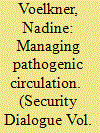

|
|
|
|
|
| Publication |
2011.
|
| Summary/Abstract |
This article traces the emergence of human security as a situated political strategy for managing the circulation of pathogens relating to Burmese migrant communities in Thailand. Specifically, it focuses on the intricate and productive interplay of a range of human and non-human elements that helped to bring forth and shape the vernacular micropolitics of human security. The article documents the techno-(bio)political mechanisms of the human security intervention in two of Thailand's provinces. By enframing, ordering and depoliticizing the complex health world of Burmese migrants in terms of simple dichotomies in which 'unruly' nature (pathogens, diseases, bodies) is contrasted with human techno-scientific ingenuity (scientific evidence, technological innovations, managerial effectiveness), these mechanisms render the circulation of pathogens amenable to biopolitical governance. It is here argued that in the struggle to manage pathogenic circulation, human security transforms the issue of migrant health into a technical matter concerned with the (self-)management of bodies and the governmentalization of the Thai state to the exclusion of important but difficult questions concerning a violent politics of exclusion.
|
|
|
|
|
|
|
|
|
|
|
|
|
|
|
|
| 5 |
ID:
106366
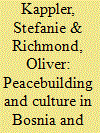

|
|
|
|
|
| Publication |
2011.
|
| Summary/Abstract |
This article investigates problems and pitfalls involved in the EU's peacebuilding activities in Bosnia and Herzegovina. It claims that by romanticizing civil society and selectively reinforcing existing power structures, the European Union has failed to give society a stake in the peace that is being created in that country. Against this background, the article goes on to argue that local responses and forms of resistance have begun to emerge in Bosnia and Herzegovina, challenging the EU's peacebuilding mission to move towards a more contextualized engagement with local society. Rather than focusing exclusively on the EU's formal institutional mechanisms, a more contextualized approach would seek to include a wide variety of local agencies and create a space in which Bosnian society might develop alternative versions of peace that relate to people's everyday lives. The main challenge for the EU, the article concludes, is to take the diversity of Bosnia's local voices seriously in efforts to promote a hybrid, sustainable peace.
|
|
|
|
|
|
|
|
|
|
|
|
|
|
|
|
| 6 |
ID:
106369
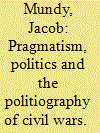

|
|
|
|
|
| Publication |
2011.
|
| Summary/Abstract |
While Håvard Strand's rejoinder to 'Deconstructing civil wars' is a welcome invitation to dialogue, its criticisms are grounded in a fundamental misreading of my article. Here I will attempt to address the sources of confusion, which stem from poor execution on my part and some theoretical blinders on the part of the author of the rejoinder. This response will clarify my ethical and theoretical concerns with the way in which mass intra-territorial armed violence has been studied recently, and then reinforce my proposed warrant for a pragmatic (read: political) turn in the civil war/new war debate. This intervention will conclude by suggesting that the present debate highlights the need for a third estate in political studies, one that operates between political science and political theory: politiography.
|
|
|
|
|
|
|
|
|
|
|
|
|
|
|
|
|
|
|
|
|